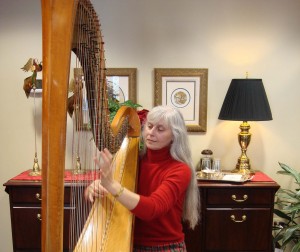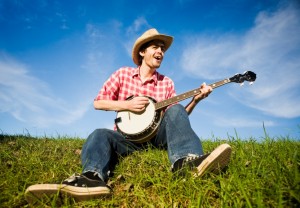 Most of us have seen angels represented as either winged cherubs or gracefully-robed harp players. Just before last Christmas, I met a real harp-playing angel named Barbara Fackler. I was introduced to Barbara because she had been employed by Passages Hospice to provide music for a resident at Aurora Rehabilitation Center. Frankly, I had never heard of music therapy, so I was eager to understand what Barbara does and how she helps the healing process.
Barbara became involved with therapeutic music accidentally. She has loved playing the harp since she was a child—she says there was no other instrument that she wanted to play. Her idea of the perfect harp is a pedal harp, which is a large, heavy, awkward-to-move instrument. She smiled when she told me that her husband, Dan Fackler, always jokes that she married him only because he was the most careful guy that she had “auditioned” as a harp-transporting boyfriend.
A number of years ago, Barbara decided she needed to acquire a harp small enough to take when visiting relatives out of town. The first trip the little harp made was to visit her grandfather, whose Alzheimer’s had progressed to the point that he rarely spoke. However, after Barbara played her harp for him, he went from silence to speaking in short sentences. Additionally, he became responsive in his interactions with other family members. It was a stunning discovery. “There is something magical about acoustic sound. Scientific research has repeatedly suggested that acoustic music has a more profound effect than recorded music,” Barbara relates.
In addition to her work with hospice patients, Barbara uses her harp as a way to share her gift of music with friends and loved ones who are ill. She takes her harp with her to the hospital sick room. “Having a conversation with someone in the hospital can be very exhausting to the patient. So, I decided to just show up with my harp and play beautiful music. It is great to just go, play, and provide a human connection that does not require any expectations of an interactive response.”
Barbara has earned respect for her uncanny ability to connect with many seniors and others who suffer from chronic progressive diseases. One of her clients at Aurora Rehabilitation Center has primary progressive aphasia. “Aphasia” means the inability to create words or speak. This particular client cannot recover and often appears confused and unintelligible. However, following a music session in which Barbara plays the harp for an hour, the client often appears much more capable and articulate for the next few days.
One of Barbara’s current endeavors is teaching the harp to senior citizen students. She told me that learning to play a new instrument is one of the best ways to create mental stimulation. She says, “Musicians work between the left and right hemispheres of their brains faster than other people. In addition, it’s great therapy after a stroke. If you teach the dominant side of the body to do something, then the less-dominant side can learn to mimic.” She has seen how learning to play the harp after a stroke allows people to regain more functionality than other types of therapy.
Barbara has just completed a new CD entitled Pleasantries & Diversions. You can click on this link: www.hornandharp.com to find out how to purchase that CD. I highly recommend that you consider visiting her website www.harpinstead.com or phoning her at 630-665-6098 to purchase her music and/or engage her services as a harpist.
Most of us have seen angels represented as either winged cherubs or gracefully-robed harp players. Just before last Christmas, I met a real harp-playing angel named Barbara Fackler. I was introduced to Barbara because she had been employed by Passages Hospice to provide music for a resident at Aurora Rehabilitation Center. Frankly, I had never heard of music therapy, so I was eager to understand what Barbara does and how she helps the healing process.
Barbara became involved with therapeutic music accidentally. She has loved playing the harp since she was a child—she says there was no other instrument that she wanted to play. Her idea of the perfect harp is a pedal harp, which is a large, heavy, awkward-to-move instrument. She smiled when she told me that her husband, Dan Fackler, always jokes that she married him only because he was the most careful guy that she had “auditioned” as a harp-transporting boyfriend.
A number of years ago, Barbara decided she needed to acquire a harp small enough to take when visiting relatives out of town. The first trip the little harp made was to visit her grandfather, whose Alzheimer’s had progressed to the point that he rarely spoke. However, after Barbara played her harp for him, he went from silence to speaking in short sentences. Additionally, he became responsive in his interactions with other family members. It was a stunning discovery. “There is something magical about acoustic sound. Scientific research has repeatedly suggested that acoustic music has a more profound effect than recorded music,” Barbara relates.
In addition to her work with hospice patients, Barbara uses her harp as a way to share her gift of music with friends and loved ones who are ill. She takes her harp with her to the hospital sick room. “Having a conversation with someone in the hospital can be very exhausting to the patient. So, I decided to just show up with my harp and play beautiful music. It is great to just go, play, and provide a human connection that does not require any expectations of an interactive response.”
Barbara has earned respect for her uncanny ability to connect with many seniors and others who suffer from chronic progressive diseases. One of her clients at Aurora Rehabilitation Center has primary progressive aphasia. “Aphasia” means the inability to create words or speak. This particular client cannot recover and often appears confused and unintelligible. However, following a music session in which Barbara plays the harp for an hour, the client often appears much more capable and articulate for the next few days.
One of Barbara’s current endeavors is teaching the harp to senior citizen students. She told me that learning to play a new instrument is one of the best ways to create mental stimulation. She says, “Musicians work between the left and right hemispheres of their brains faster than other people. In addition, it’s great therapy after a stroke. If you teach the dominant side of the body to do something, then the less-dominant side can learn to mimic.” She has seen how learning to play the harp after a stroke allows people to regain more functionality than other types of therapy.
Barbara has just completed a new CD entitled Pleasantries & Diversions. You can click on this link: www.hornandharp.com to find out how to purchase that CD. I highly recommend that you consider visiting her website www.harpinstead.com or phoning her at 630-665-6098 to purchase her music and/or engage her services as a harpist.

0

